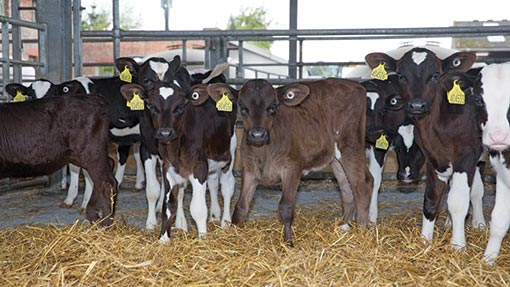Livestock farmers must prepare for Red Tractor changes

Beef and sheep farmers using prescription medicines will require a vet visit at least once a year under new Red Tractor standards.
Red Tractor has reviewed the standards that apply across each of its assurance schemes and is to introduce changes aimed at giving consumers greater reassurance, particularly with the use of vet medicines.
Emma Graves, Red Tractor technical manager, explains that beef and lamb farmers have always been required to have a health plan, but they now need to complete an annual herd/flock health and performance review. This is to look at the reasons for treatment and mortality data to identify the key health problems on their farm.
“We are encouraging people to make more of health plans. It is good business practice to try to identify issues on farm and do something about them.”
Health plans will also now need to include details on how euthanasia is carried out and by whom. For breeding farms, it should outline procedures to ensure newborns receive adequate colostrum.
Staff management
Recognising staff as a key element to ensuring standards are met, the rules relating to staff look very different. It applies to full- and part-time employees, as well as family members.
The key changes are:
- New staff members must be introduced to the farm and their tasks explained to them, but employers don’t need to document this.
- For existing and future staff employers must review their competence regularly. This may be as simple as watching them work or checking it once completed and doesn’t have to be documented. If an employer finds any issues, additional training should be given.
- To encourage continual personal development, Red Tractor recommends at least one member of staff on dairy farms is a member of a scheme that records skills/training, such as DairyPro or IntSCA.
- If an employer uses a labour provider for long-term, short-term or even regular staff (such as holiday cover), he must protect his business by getting written confirmation that the provider is providing competent staff and that it has a gangmaster’s licence.
For dairy farmers, good staff communication is crucial to avoid contamination of milk with drug residue. Assured farmers will need to have a system in place to ensure staff have the information to manage cows undergoing treatment and know which cows are in medicine withdrawal.
Datasheets for all chemicals used in the milk production area need to be easily accessible to staff.
Milk quality
Another key element to maintaining milk quality is ensuring it is collected in a safe and hygienic area, as well as effective cooling.
Tanker drivers can potentially spread diseases between farms, therefore it is now a requirement that they are able to walk on a hard standing area from the cab to the back axle of the vehicle when collecting milk.
Tank temperature gauges must be functioning and cooling systems and storage tanks must be maintained, demonstrated by a maintenance contract, annual service or maintenance by a refrigeration engineer.
Dairy bedding
Recent months have seen an increasing interest in novel bedding materials and Red Tractor has clarified its standards for bedding.
Bedding materials must be safe, suitable and legal. Red Tractor is in the process of determining with Defra how recycled manure solids fits into this definition and will provide more guidance through its website and future newsletters.
Calves and lambs
Standards for artificially reared calves have been updated to include artificially reared lambs.
One key change is that calves and lambs in individual pens must be able to not only see another calf/lamb, but also touch them, in line with legal requirements.
Calves must also be given two milk feeds a day, until they are 28 days old, in line with Defra’s legal clarification, and both calves and lambs must have access to drinking water at all times.
Read the full changes on the Red Tractor website
Tighter pig farm biosecurity rules
The increasing threat of overseas pig diseases such as African swine fever and porcine enteric diarrhoea virus (PEDv) highlight the need for robust biosecurity.
Red Tractor has tightened the standards covering pigs at shows, which are exposed to different infections that could affect the herd health status. The risk is deemed too great, therefore, pigs are now required to be taken direct to slaughter if they have been to a show.
Farmers are also now required to collate and record total antibiotic use on their farm and annually review the figure with their vet so trends can be identified to ensure the responsible use of medicines.
Breeding stock must already come from assured farms and this is being extended to include semen. Farmers are required to keep records of both breeding stock and semen supplies.
